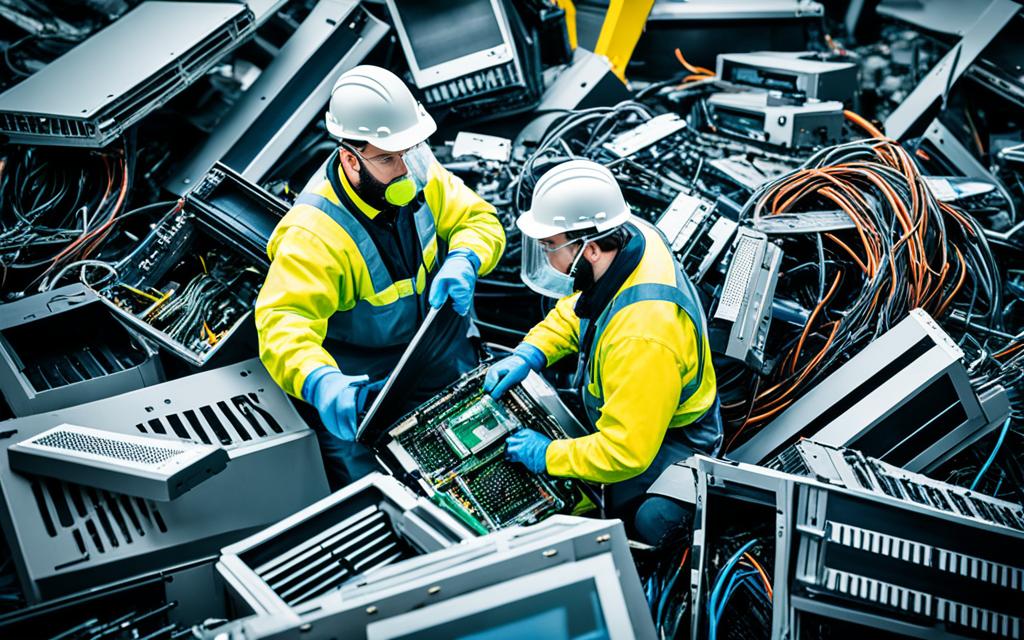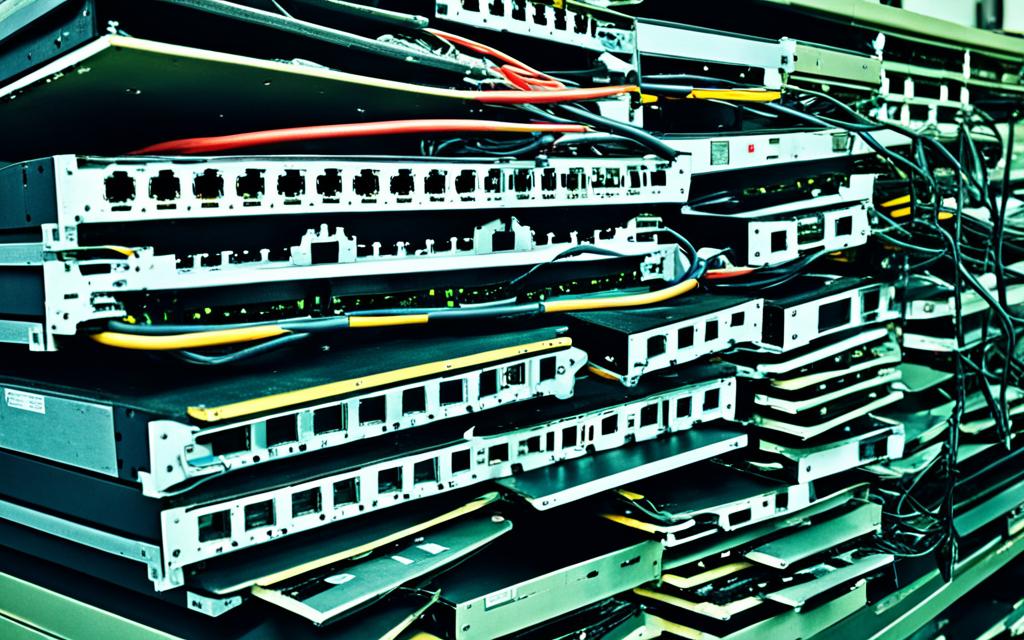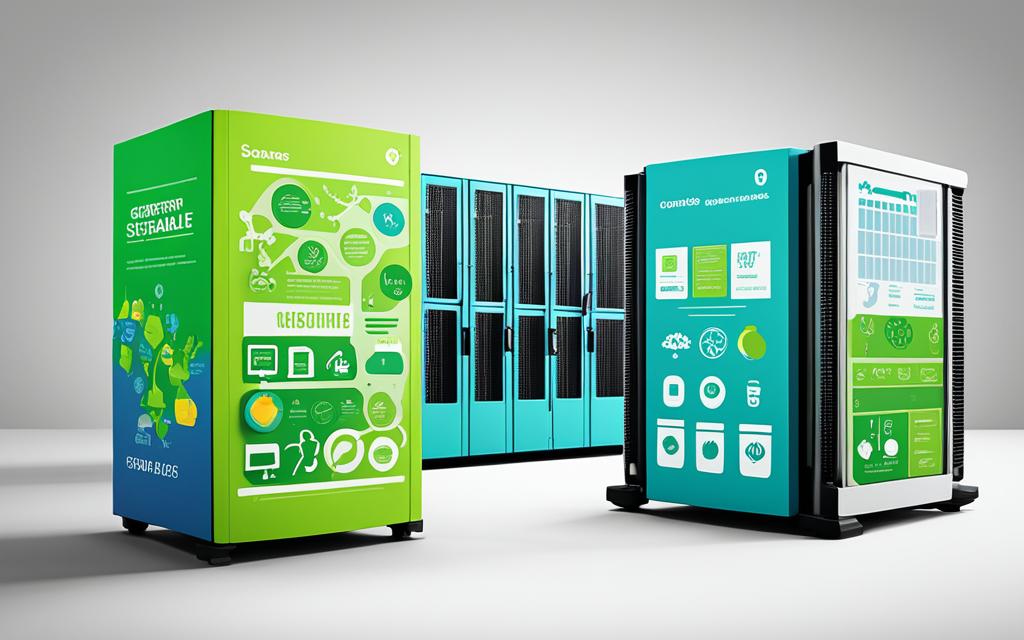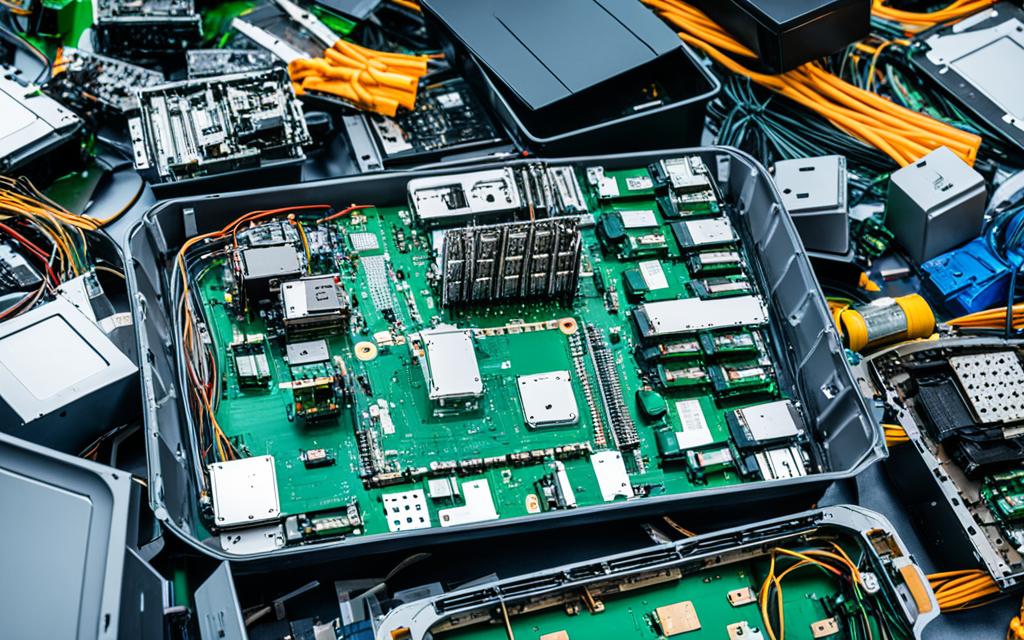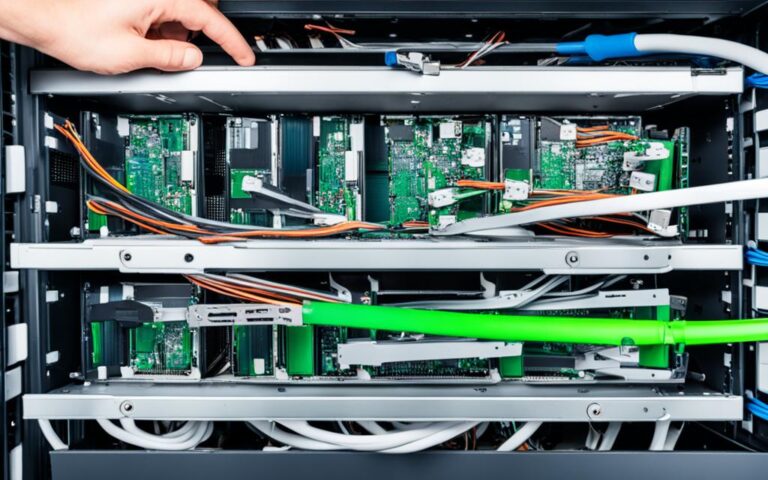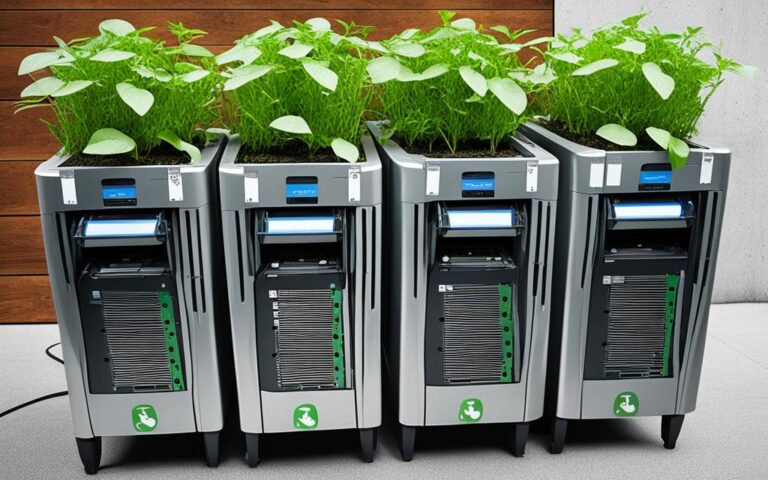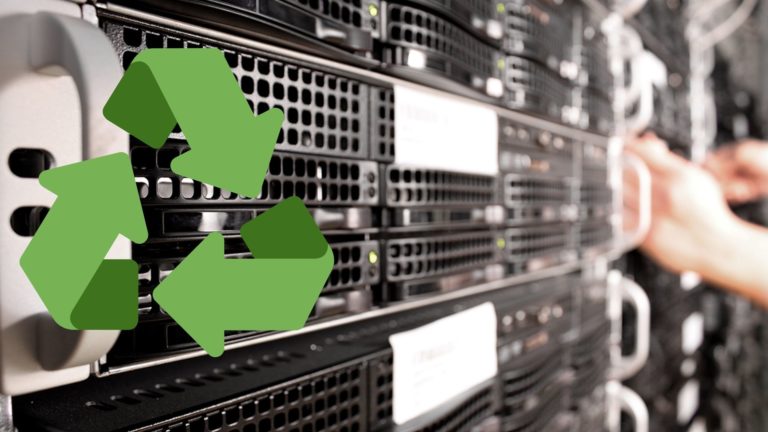The Role of Server Recycling in IT Asset Disposition (ITAD)
Server recycling plays a vital role in IT Asset Disposition (ITAD), offering a sustainable solution for decommissioned servers. In an era of growing environmental concerns, server recycling helps minimize electronic waste, recover valuable materials, and promote a circular economy. By recycling servers, businesses in the UK can reduce their carbon footprint and contribute to a greener future.
With the rapid advancement of technology, the lifecycle of servers has become shorter, leading to a significant increase in electronic waste. Improper disposal of decommissioned servers can have detrimental effects on the environment. Toxic substances present in servers can contaminate soil and water, posing risks to ecosystems and human health.
Choosing a reputable server recycling service in the UK, such as EcoGreen, ensures responsible and sustainable IT asset management. EcoGreen specializes in server recycling, prioritizing environmental sustainability and secure data destruction.
By partnering with EcoGreen, businesses can not only dispose of their decommissioned servers responsibly but also minimize their environmental impact. Through server recycling, valuable metals and resources can be recovered, reducing the demand for new materials and conserving natural resources.
EcoGreen’s server recycling services comply with all environmental regulations and prioritize data security. With their expertise, businesses can ensure that sensitive information is properly destroyed, minimizing the risk of data breaches.
Join the movement towards a greener future by opting for server recycling and IT Asset Disposition (ITAD) in the UK. Choose EcoGreen for secure, sustainable, and responsible IT asset management. Contact EcoGreen today to learn more about their server recycling services.
The Environmental Impact of Decommissioned Servers
Decommissioned servers pose a significant environmental threat due to their hazardous materials. If not recycled properly, these servers can contaminate the soil and water, leading to pollution and endangering ecosystems and human health. Safely recycling servers is crucial to mitigate these harmful effects and promote a more sustainable production cycle.
By recycling decommissioned servers, we can effectively reduce electronic waste (e-waste) and recover valuable metals, which helps conserve resources and minimize environmental degradation. Proper server recycling prevents the release of hazardous substances into the environment, reducing the demand for new resources and promoting a circular economy.
Server recycling plays a vital role in safeguarding our planet from the detrimental impact of e-waste. Not only does it minimize pollution and protect ecosystems, but it also reduces the carbon footprint associated with the production of new servers. By responsibly recycling decommissioned servers, we can contribute to a cleaner, greener future.
Proper server recycling ensures the longevity of our environment, reduces e-waste, and fosters a circular economy.
The Importance of a Circular Economy
A circular economy seeks to minimize waste and maximize the utilization of resources. It promotes the concept of reusing and recycling materials to create a closed-loop system, minimizing the need for new resource extraction and reducing the environmental impact of production processes.
By recycling decommissioned servers, we contribute to the circular economy by reintroducing valuable materials into the production cycle. This reduces the need for mining or extracting new resources, conserving energy and minimizing environmental disruption.
Implementing proper server recycling practices aligns with the principles of a circular economy, driving us towards a more sustainable and resource-efficient future.
| Environmental Impact | E-Waste Reduction | Circular Economy |
|---|---|---|
| Prevents pollution and ecosystem damage | Reduces electronic waste accumulation | Promotes resource conservation |
| Minimizes risks to human health | Recovers valuable metals | Encourages closed-loop material utilization |
| Reduces release of hazardous substances | Minimizes carbon footprint | Sustains a more sustainable production cycle |
The Benefits of Server Recycling
Server recycling offers numerous environmental and economic benefits. By diverting electronic waste from landfills, this practice helps reduce pollution and conserve valuable resources. Additionally, recycling servers plays a vital role in lowering the carbon footprint of the technology industry by minimizing the demand for new production. The recycling process can also generate revenue through the resale of refurbished parts or the extraction of valuable metals. Furthermore, server recycling contributes to data security by ensuring proper data destruction, protecting sensitive information from falling into the wrong hands.
The Environmental Benefits
One of the key advantages of server recycling is its positive impact on the environment. By diverting electronic waste from landfills, it reduces pollution, prevents the release of hazardous substances, and protects ecosystems. This practice helps in conserving resources as it maximizes the reuse and recovery of valuable materials present in decommissioned servers. By opting for server recycling, businesses actively participate in the circular economy, promoting a sustainable approach to technology disposal and resource conservation.
Economic Benefits and Revenue Generation
Server recycling not only benefits the environment but also offers economic advantages. By recycling servers, companies can generate revenue through the refurbishment and resale of usable parts, reducing overall disposal costs. Additionally, the extraction of valuable metals from servers provides an additional source of income. Embracing server recycling as a part of responsible IT asset management yields financial benefits while contributing to a more sustainable and productive economy.
“Server recycling offers a win-win situation, allowing businesses to reduce their environmental impact while also benefiting economically.”
Lowering the Carbon Footprint
The technology industry has a substantial carbon footprint, largely due to the production of new servers and other electronic equipment. However, through server recycling, it is possible to reduce this carbon footprint. By extending the lifespan of servers through recycling and refurbishment, the demand for new equipment decreases. This reduction in demand leads to a decrease in the energy and resources required for manufacturing new servers, resulting in a lower overall carbon footprint for the industry.
Data Security and Confidentiality
Proper data destruction is a critical aspect of server recycling. When decommissioned servers are not properly handled, they can pose significant data security risks. By choosing a reputable server recycling service, businesses can ensure secure data destruction, protecting sensitive information from unauthorized access or breaches. This aspect is particularly crucial for industries that handle sensitive customer data, such as healthcare, finance, and legal sectors.
Server recycling is an environmentally responsible and economically beneficial practice that allows businesses to reduce their environmental impact, conserve resources, lower their carbon footprint, and protect data security. By partnering with a reputable server recycling service, companies can make a positive impact on the environment while also benefiting financially. Embracing server recycling as a part of responsible IT asset management exemplifies a commitment to sustainability and contributes to the overall well-being of the planet.
The Process of Server Recycling
Server recycling is a meticulous process that involves several key steps to ensure the proper handling and disposal of decommissioned servers. By following this process, businesses can not only mitigate their environmental impact but also adhere to regulatory requirements and promote sustainability.
1. Planning: The server recycling service begins by assessing the project requirements and developing a comprehensive plan. This includes determining the volume of servers to be recycled, evaluating the condition of each server, and identifying potential opportunities for reusing or recycling components.
2. Sorting and Disassembly: Once the planning phase is complete, servers are sorted based on their condition and potential for reuse or recycling. This step ensures that reusable parts can be identified and salvaged, reducing the overall waste generated. The servers are then disassembled, and the reusable components are carefully removed.
3. Disposal and Material Recovery: During the disassembly process, non-reusable components are separated by material type for proper processing and disposal. Valuable elements, such as precious metals and other recyclable materials, are extracted for recovery purposes. At the same time, hazardous materials are safely disposed of to prevent environmental contamination.
4. Documentation and Certification: Throughout the server recycling process, proper documentation is maintained to track the handling and disposal of servers. This documentation ensures compliance with environmental regulations and provides an audit trail of the recycling activities. Certifications may also be obtained to validate the responsible handling and disposal of servers.
By following these steps, businesses can effectively manage the server recycling process, minimizing environmental impact, promoting resource conservation, and ensuring compliance with regulations.
| Server Recycling Process | Key Steps |
|---|---|
| 1. Planning | Assess project requirements and develop a comprehensive plan |
| 2. Sorting and Disassembly | Sort servers based on condition and potential for reuse/recycling. Disassemble servers and identify reusable components. |
| 3. Disposal and Material Recovery | Safely dispose of non-reusable components and recover valuable materials. |
| 4. Documentation and Certification | Maintain proper documentation to track handling and disposal. Obtain certifications for responsible recycling. |
The Risks of Improper Server Disposal
Improper disposal of servers poses significant risks to both the environment and data security. Servers, if not disposed of properly, contain toxic substances that can be released into the soil and water, causing pollution and detrimental effects on ecosystems. Moreover, improper server disposal exposes businesses to potential data breaches and cybersecurity threats.
When servers are disposed of in an irresponsible manner, they can end up in landfills where toxic chemicals can contaminate the environment. This pollution can harm local wildlife, contaminate water sources, and pose health risks to nearby communities. It is crucial to recognize the environmental hazards associated with improper server disposal and take proactive steps to prevent such risks. By opting for responsible server recycling, businesses can ensure that their old servers are recycled in an environmentally sustainable way, preventing the release of hazardous substances and minimizing their ecological footprint.
Additionally, improper server disposal can lead to data security risks. Servers often store sensitive and confidential information, and if not handled correctly during the disposal process, this data can be vulnerable to unauthorized access. Unauthorized individuals or criminals may attempt to retrieve these discarded servers to access valuable data or conduct cyber-attacks. This exposes businesses to significant financial losses, reputation damage, and legal implications.
Choosing a reputable server recycling service is vital to mitigate these risks. A trusted server recycling provider follows proper disposal protocols, ensuring environmentally responsible practices and secure data destruction. By partnering with a reputable company, businesses can mitigate the risks associated with improper server disposal and safeguard both the environment and their sensitive data.
Remember: Proper server recycling not only protects the environment from hazardous substances but also safeguards sensitive information, ensuring peace of mind for businesses.
| Risks of Improper Server Disposal | Environmental Hazards | Data Security Risks |
|---|---|---|
| Release of toxic substances into the environment | Land and water pollution | Data breaches and unauthorized access |
| Contamination of soil and water sources | Ecosystem damage | Cybersecurity threats |
| Health risks to humans and wildlife | Reputation damage | Financial losses |
| Legal implications |
The Need for IT Asset Disposition (ITAD)
When it comes to responsible IT asset management, the process of IT asset disposition (ITAD) plays a crucial role. While IT asset disposal primarily focuses on secure destruction or recycling, ITAD takes a more comprehensive approach by encompassing a broader lifecycle strategy for IT equipment.
IT asset disposition involves the data-safe destruction or recycling of IT equipment, ensuring that sensitive data is protected throughout the process. By choosing ITAD, businesses can not only securely dispose of their assets but also contribute to reducing e-waste, conserving valuable resources, and promoting environmental sustainability.
One significant aspect of responsible IT asset management is server recycling, which is an essential part of ITAD. By recycling decommissioned servers, businesses can minimize their environmental impact and contribute to a circular economy by recovering valuable materials from these devices.
“Responsible IT asset management, including server recycling, reduces e-waste, conserves resources, and protects sensitive data.”
Implementing IT asset disposition practices not only ensures a responsible approach to technology obsolescence but also protects businesses from potential data breaches. By securely disposing of IT assets through ITAD, organizations can safeguard sensitive information and mitigate the risks associated with improper disposal.
Overall, IT asset disposition provides a comprehensive solution that emphasizes responsible IT asset management. By prioritizing the secure destruction or recycling of IT equipment and incorporating server recycling practices, businesses can reduce e-waste, conserve resources, and protect sensitive data, contributing to a more sustainable future.
Benefits of Choosing Vyta for IT Asset Disposition
Vyta, a trusted IT asset disposition provider, offers a comprehensive approach that aligns with the circular economy. Their meticulous process includes data destruction, device functionality assessment, and repair or refurbishment considerations. Vyta generates revenue through asset resale, contributing to the circular economy and lowering clients’ carbon footprint. They prioritize secure data handling and have achieved certifications for environmentally responsible electronics management and carbon neutrality.
“At Vyta, we are committed to sustainable IT asset disposition and helping businesses contribute to a circular economy. Our process ensures that your data is securely destroyed, and we carefully assess the functionality of each device. By considering repair or refurbishment options, we extend the lifecycle of IT assets, minimizing e-waste and resource consumption. Through the resale of assets, we generate revenue and help our clients reduce their carbon footprint. We take data security seriously, and our certifications for environmentally responsible electronics management and carbon neutrality demonstrate our commitment to responsible practices.”
Key Benefits of Choosing Vyta for IT Asset Disposition:
- Sustainable IT Asset Disposition: Vyta’s comprehensive approach is aligned with the principles of the circular economy, minimizing e-waste and promoting sustainable resource management.
- Revenue Generation: By reselling refurbished assets, Vyta helps businesses generate revenue while contributing to the circular economy.
- Data Security: Vyta prioritizes secure data handling, ensuring that sensitive information is properly destroyed and protected.
To further emphasize their commitment to sustainable IT asset disposition, Vyta has obtained certifications for environmentally responsible electronics management and carbon neutrality. These certifications validate their adherence to industry-leading standards and demonstrate their dedication to ethical and environmentally friendly practices.
Why Choose Vyta for IT Asset Disposition?
Vyta stands out among IT asset disposition providers due to their holistic approach and commitment to sustainability. By partnering with Vyta, businesses can ensure the responsible management of their IT assets, promote a circular economy, generate revenue, and maintain data security.
Conclusion
Sustainable server recycling and responsible IT asset management are essential practices for businesses looking to minimize their environmental impact and optimize their IT infrastructure. By partnering with Vyta, a trusted leader in IT asset disposition, organizations can ensure secure and environmentally friendly practices while contributing to the circular economy.
Server recycling offers a sustainable solution for decommissioned servers, reducing electronic waste and conserving valuable resources. With Vyta’s commitment to sustainability, businesses can rest assured that their IT equipment will be handled responsibly, preventing the release of hazardous substances into the environment.
Vyta’s comprehensive IT asset disposition practices include secure data destruction, device functionality assessment, and repair or refurbishment considerations. This approach not only protects sensitive data but also generates revenue through asset resale, further contributing to a circular economy.
When it comes to sustainable server recycling and responsible IT asset management, Vyta is the trusted partner that businesses can rely on. Contact Vyta today to ensure the sustainable disposition of your organization’s IT equipment and join the movement towards a greener and more sustainable future.
FAQ
What is the role of server recycling in IT Asset Disposition (ITAD)?
Server recycling is an essential aspect of ITAD as it provides a sustainable solution for decommissioned servers. By recycling servers, businesses can minimize their environmental impact, contribute to the circular economy, ensure data security, and optimize their IT infrastructure.
What is the environmental impact of decommissioned servers?
Decommissioned servers can have significant environmental impacts if not recycled properly. They contribute to e-waste and pose risks to ecosystems and human health through the release of hazardous materials. Server recycling helps prevent these harmful effects by reducing e-waste, recovering valuable metals, and promoting a more sustainable production cycle.
What are the benefits of server recycling?
Server recycling offers numerous environmental and economic benefits. It diverts electronic waste from landfills, reducing pollution and conserving resources. Recycling servers also helps lower the carbon footprint of the technology industry by minimizing the demand for new production. Additionally, it can generate revenue through the resale of refurbished parts or extraction of valuable metals, promoting a circular economy.
What is the process of server recycling?
The process of server recycling involves planning, sorting and disassembly, disposal and material recovery, and documentation and certification. The server recycling service assesses project requirements and develops a comprehensive plan. Servers are sorted based on condition and potential for reuse or recycling, disassembled with reusable parts identified, and non-reusable components separated by material type for processing. Throughout the process, proper documentation is maintained to track handling and disposal and ensure compliance with regulations.
What are the risks of improper server disposal?
Improper disposal of servers poses risks to the environment and data security. Servers contain toxic substances that can leach into the soil and water, causing pollution and ecosystem damage. Improper disposal also exposes businesses to data breaches and cybersecurity threats. Choosing a reputable server recycling service ensures environmentally responsible disposal and secure data destruction, mitigating these risks.
What is the need for IT Asset Disposition (ITAD)?
IT Asset Disposition (ITAD) involves the secure destruction or recycling of IT equipment, including servers. It is necessary to responsibly manage IT assets, reduce e-waste, conserve resources, and protect sensitive data. Proper IT asset management, including server recycling, is crucial for environmental sustainability and data security.
What are the benefits of choosing Vyta for IT Asset Disposition?
Vyta is a trusted IT Asset Disposition provider that offers a comprehensive approach aligned with the circular economy. Their process includes data destruction, device functionality assessment, and repair or refurbishment considerations. Vyta generates revenue through asset resale, contributing to the circular economy and reducing clients’ carbon footprint. They prioritize secure data handling and have achieved certifications for environmentally responsible electronics management and carbon neutrality.
Why is sustainable server recycling important?
Sustainable server recycling is important because it helps minimize e-waste, recover valuable materials, reduce the carbon footprint of the technology industry, and promote a circular economy. By choosing a reputable service like Vyta, businesses can prioritize environmental sustainability, data security, and optimized IT infrastructure.

